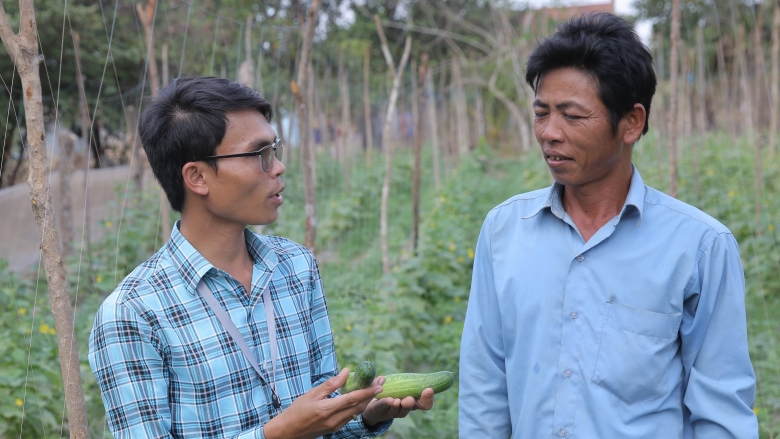Working at a cucumber farm in Cambodia’s Tbong Khmum province, Horn Oeun, a provincial agricultural advisor, says he believes that the benefits his efforts are bringing to farmers will last for many years to come.
Oeun is helping train farmers on improved cash crop and animal raising techniques so that rural families get more benefits from their land. The training is being organized as part of the World Bank’s Land Allocation for Social and Economic Development projects (LASED and LASED II). The projects, which also received technical support from German International Cooperation (GIZ), will be wrapping up this year.
“The farmers we work with are very committed to their crops, fish and animals, which provide good additional income,” says Oeun. Oeun estimates that around 60 -70 percent of farmers who participated in project training apply the newly learned techniques immediately, while more start using the knowledge after they see field demonstrations.
Sun Ron, 43, one of the farmers who attended training in Tbong Khmum’s Cham Kravien commune, has applied his new knowledge to growing cucumbers and lettuce on his residential plot. Sun Ron says these vegetables make him about 6.5 million riels (US$1,650) per year, along with the 5 million riels ($1,250) that he earns from cashew nuts on his three hectares of farmland.
Sun Ron’s neighbor, 54-year-old San Sokun, started raising chicken and fish with her husband in 2019 after completing project training. She has since earned around 6.7 million riels ($1,700) from her chickens and about 1 million riels ($250) from fish, in addition to income from vegetables and cashew nuts.
“We will continue to grow our crops and raise animals,” she says while bagging up her vegetables for sale in the village. “We are old, and this is the best earning job we can do.”
In Kratie province, a 60-year-old farmer named Kao Phalla attended project agricultural training courses in Sambok commune. The training showed him a potential market that could provide additional income to his earnings from cash crops and a small restaurant along the national highway in Kakot village.
Kao Phalla plans to expand his vegetable farm and mobilize other farmers to join him in a group that can produce larger quantities of vegetables and so supply for bigger markets. “Now we have the skills and experience to grow better and more vegetables, so we can scale up,” he explained.
Kao Phalla started expanding his vegetable farm in early 2020 when support from his children, who worked in Thailand, Phnom Penh and Siem Reap, was cut due to COVID-19 restrictions. Before the pandemic, his children sent home around $300 per month, but when two of the children lost their jobs, that dropped to about $60 per month. Over the rest of 2020, Phalla earned about 2 million riels ($500) from his vegetable farm. During the dry season, he switches to vegetables that make better use of water such as string beans and morning glory.
Sun Ron, San Sokun and Phalla are from three of the 5,091 families who received land and livelihood support from the LASED projects. The projects allocated residential plots and farmland to landless and small landholder families, along with seeds and training to improve productivity for cash crops— vegetables, cassava, cashew nut and rubber trees — and animal raising.
The projects have also supported construction of rural roads, bridges, small irrigation systems, schools, clinics and community markets. As of June 2020, 3,362 (76 percent) of the families who received land had already been granted land titles. The remaining families are going to receive land titles in 2021.
To ensure the sustainability of this success at all sites, the project team has developed an exit strategy for completing all outstanding activities and ensuring sustainability, including securing land titles for the remaining recipients, setting up community development funds, transferring know-how to communities, and promoting market linkages.
So far, eight agricultural cooperatives have been established and two of these have signed contracts with a private company, Cambodian Agriculture Cooperative Corporation PLC., which will buy their organic cassava.

